Looking to boost your gains and stay on track with your workouts? The right weightlifting app can be your ultimate training partner. From beginner-friendly programs to advanced lifting tools, these apps help you log workouts, monitor progress, and stay focused in and out of the gym. Some offer AI-based training plans, others rely on real-time coaching or guided classes, and a few prioritize simplicity and full control over your routine.
While most of your focus may be on what happens inside the gym, supporting your training outside of it is just as important especially when it comes to nutrition and consistency. That’s where ReciMe comes in. Known as one of the world’s top recipe organizers, ReciMe helps you plan your meals, save your favorite recipes, and instantly generate smart grocery lists. If you’re aiming to fuel your training properly or stay on top of meal prep, ReciMe makes it easier to stay consistent without added stress. Use it to simplify your eating routine, reduce decision fatigue, and keep your fitness goals aligned both in and out of the gym.


1. Fitbod
Fitbod adapts strength training plans based on a user’s previous workouts, available equipment, and muscle recovery. The app uses a recommendation system to suggest exercises, adjusting routines to balance recovery and maximize training variety. It removes the need for manual workout planning by generating sessions that evolve over time.
Fitbod tracks detailed metrics and supports users by analyzing which muscle groups have been trained and how much rest they’ve had. While it offers guidance and personalization, it does not prioritize community or user-shared content. Its main focus is adjusting workouts to fit a user’s fitness level, goals, and training history.
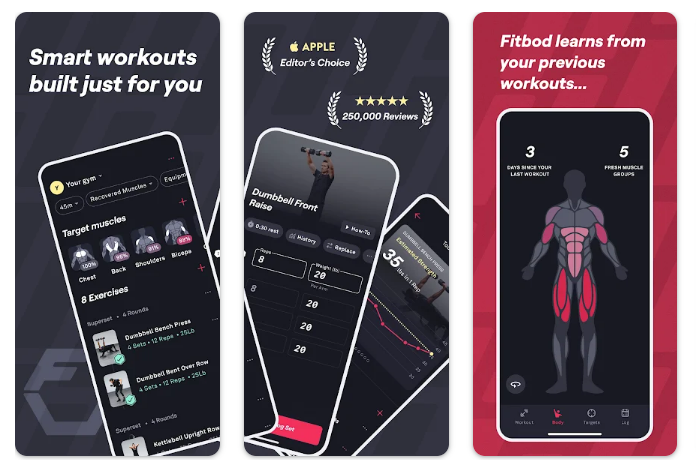
Key Highlights:
- Adaptive workouts based on past training
- Recovery tracking to avoid overtraining
- Equipment-aware workout generation
- Custom exercise recommendations
- Available on Android and iOS
Who it’s best for:
- Individuals wanting automatic workout suggestions
- Users with access to varying gym equipment
- People looking to follow structured strength programs
Contact Information:
- App store: apps.apple.com/us/app/fitbod-gym-fitness-planner
- Google Play: play.google.com/store/apps
- Website: fitbod.me
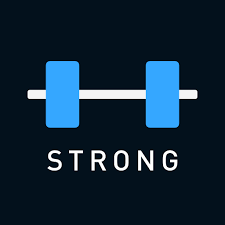
2. Strong
Strong focuses on workout tracking with a clean and easy-to-use interface. It allows users to log their strength training sessions, track their one-rep max, and view progress over time with charts and history tools. The app includes advanced features like custom timers, supersets, RPE input, and body measurements, all while keeping the interface simple.
Strong works across mobile devices and smartwatches, giving users flexibility in how they log workouts. It does not build workouts for users but provides tools to track training with accuracy. Data export and privacy controls are also built in, giving users full control over their workout records.
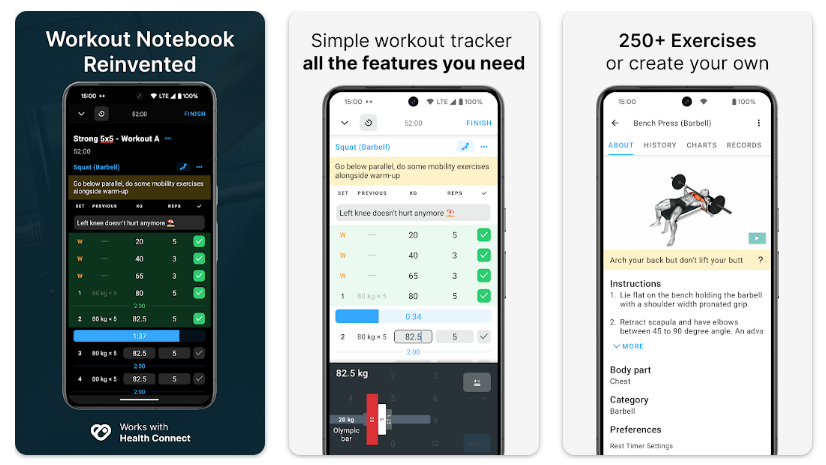
Key Highlights:
- Detailed workout tracking with advanced options
- Support for supersets, timers, and RPE
- Cross-device syncing including smartwatches
- Progress visualization with charts
- Manual logging of all strength metrics
Who it’s best for:
- People who want in-depth tracking of workouts
- Lifters who prefer to plan and log their own routines
- Users who want data export and privacy control
Contact Information:
- App store: apps.apple.com/us/app/strong-workout-tracker-gym-log
- Google Play: play.google.com/store/apps
- Website: www.strong.app
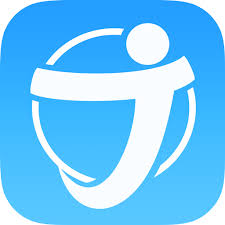
3. Jefit
Jefit combines workout planning, tracking, and analytics in one platform. Users can follow preset programs or build their own using a large exercise database. It provides features for scheduling sessions, logging training volume, and visualizing progress with charts and stats. The app also includes community features where users can share updates and routines.
Jefit allows customization of training plans, including set types, rest periods, and workout frequency. It focuses on tracking workout details and offers advanced analysis like muscle recovery charts. It also integrates a community aspect, allowing users to engage with others, although this is optional.
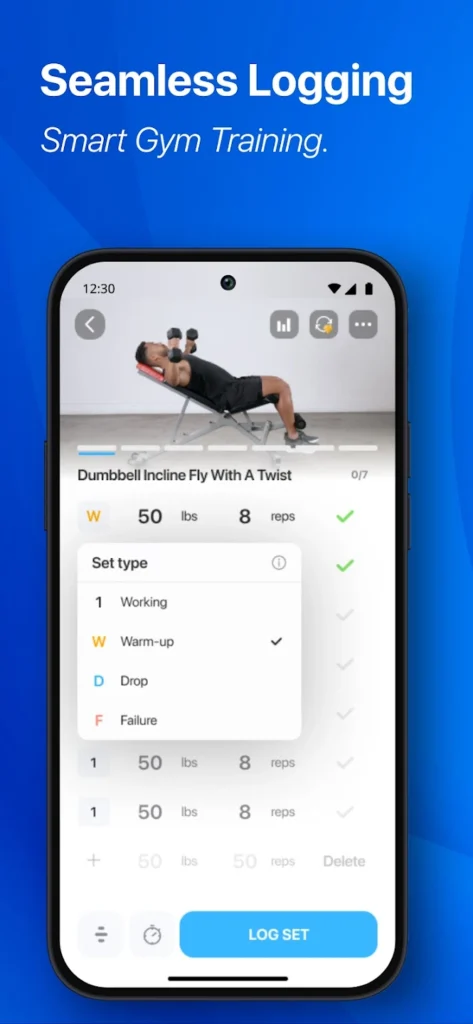
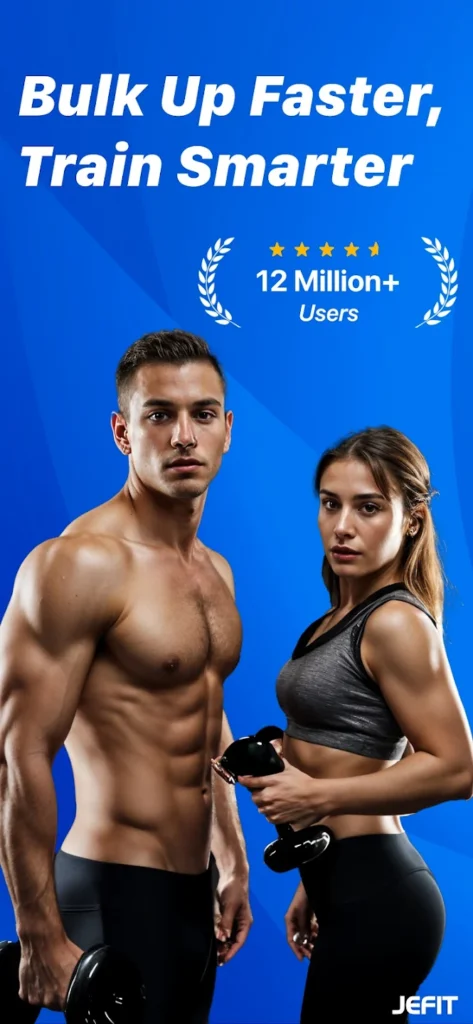
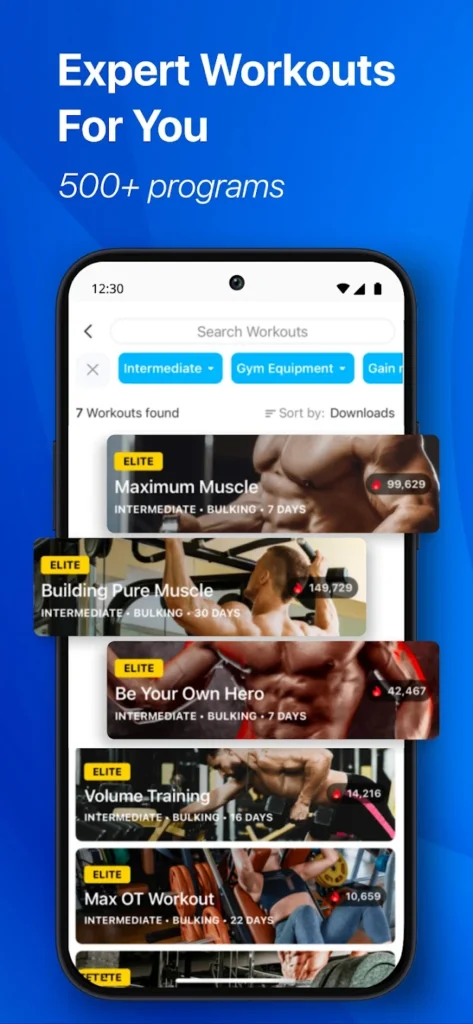
Key Highlights:
- Large database of exercises and workout plans
- Routine builder with detailed customization
- Progress tracking with charts and recovery analysis
- Community and user sharing features
- Supports mobile and watch logging
Who it’s best for:
- Users who want a structured plan with tracking features
- People who enjoy fitness communities
- Lifters interested in long-term progress analysis
Contact Information:
- App store: apps.apple.com/us/app/jefit-workout-plan-gym-tracker
- Google Play: play.google.com/store/apps
- Website: www.jefit.com
- Facebook: www.facebook.com/JefitInc
- Instagram: www.instagram.com/jefitinc
- Twitter: x.com/JefitInc
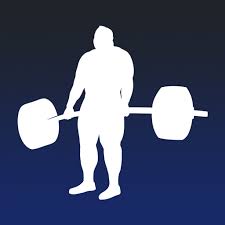
4. JuggernautAI
JuggernautAI delivers individualized strength training plans based on user input, performance, and goals. The app uses an algorithm to adjust training volume, frequency, and exercise selection. It supports both powerlifting and powerbuilding and adapts each session as users provide feedback. Programs are structured around key principles such as progressive overload and periodization, with updates made continuously based on a user’s progress and responses.
The platform also offers access to over 300 exercises, training tools like warm-up planners and RPE calculators, and optional community interaction. Users can prepare for specific events, including powerlifting meets, using the Meet Day Advisor feature. The app includes a library of technique videos and options for tracking long-term performance. It focuses on data-informed programming rather than motivational or social elements.

Key Highlights:
- Individualized programs based on training feedback
- Includes tools like warm-up planners and RPE calculators
- Over 300 exercises with coaching videos
- Meet Day Advisor for competition prep
- Tracks history and adjusts over time
Who it’s best for:
- Lifters focused on powerlifting or powerbuilding
- Athletes preparing for competitions
- Users who want detailed, algorithm-based programming
Contact Information:
- App store: apps.apple.com/us/app/juggernautai
- Google Play: play.google.com/store/apps
- Website: www.juggernautai.app
- Facebook: www.facebook.com/JTSstrength
- Instagram: www.instagram.com/juggernauttraining

5. Caliber
Caliber uses science-based methods to deliver strength training and nutrition programs guided by one-on-one coaching. After users complete a fitness assessment, the app develops a personalized plan that combines strength, cardio, nutrition, and habit tracking. Coaches work with users to ensure consistent progress using data from the app to monitor performance and adjust the program.
The platform emphasizes measurable improvements to body composition over time and provides continuous support from a dedicated coach. Users receive feedback, training advice, and motivation directly through the app. Caliber does not focus on workout variety or community features but instead centers on personal coaching, habit-building, and long-term changes in fitness through structured, data-driven plans.
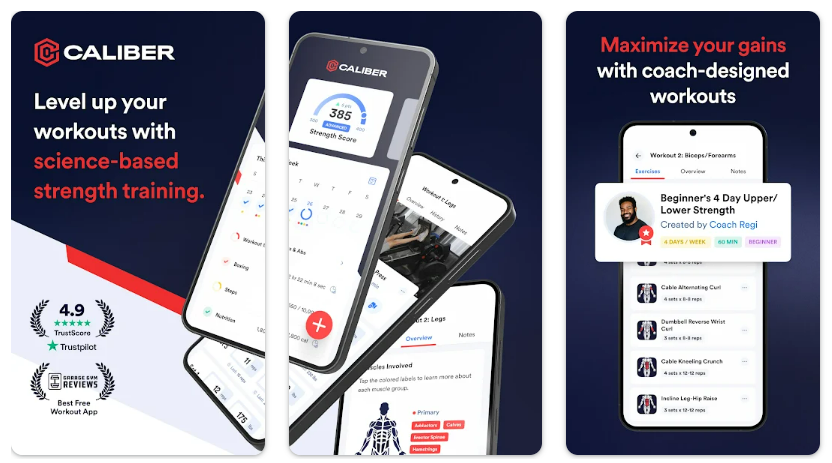
Key Highlights:
- Science-based training and nutrition plans
- Personal coaching with progress tracking
- Focus on long-term body composition improvement
- Strength and cardio integration
- Habit tracking included in program
Who it’s best for:
- People who want guided support from a personal coach
- Users interested in building habits and tracking data
- Individuals aiming for body composition changes over time
Contact Information:
- App store: apps.apple.com/us/app/caliber-strength-training
- Google Play: play.google.com/store/apps
- Website: caliberstrong.com
- Twitter: x.com/caliberstrong
- Facebook: www.facebook.com/caliberstrong
- Instagram: www.instagram.com/caliberstrong

6. Sweat
Sweat provides structured workout programs primarily designed for women, offering a broad variety of training styles including strength, HIIT, Pilates, and yoga. The app includes over 60 programs and thousands of workouts suited to different fitness levels and goals. Users can train at home or in the gym and follow programs that support life stages such as pregnancy and post-pregnancy.
The platform includes access to nutrition guidance with meal ideas and recipes. Sweat also integrates a community aspect, allowing users to connect and share progress. The focus is on providing flexible, guided workouts through an easy-to-use interface, without pushing advanced analytics or individual coaching.
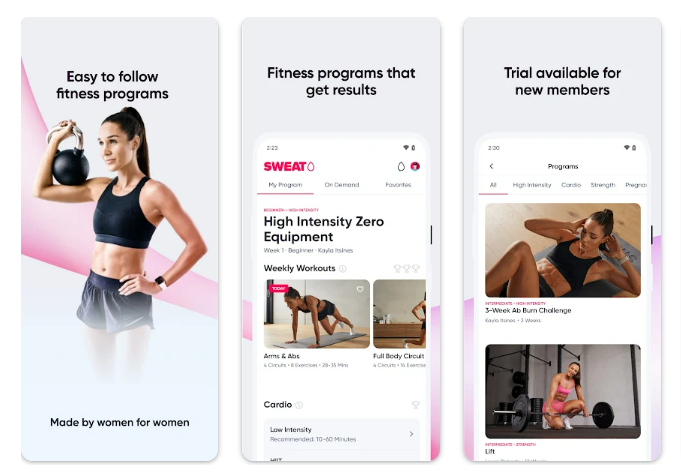
Key Highlights:
- Programs for strength, HIIT, yoga, and more
- Workout options for different life stages
- Nutrition support with meal planning ideas
- Large content library with over 13,000 workouts
- Community features available
Who it’s best for:
- Women looking for flexible home or gym training plans
- Users who prefer structured fitness programs
- People seeking variety in workout styles
Contact Information:
- App store: apps.apple.com/us/app/sweat-fitness-app-for-women
- Google Play: play.google.com/store/apps
- Website: sweat.com
- Facebook: www.facebook.com/Sweat
- Instagram: www.instagram.com/sweat
- LinkedIn: www.linkedin.com/company/sweatco

7. Hevy
Hevy is a training log app that focuses on manual workout tracking. Users can build custom routines, track sets, reps, and weights, and view their progress through clean visual summaries. The app supports exercise creation, supersets, and workout history. It is designed for individuals who prefer to plan their own workouts without automation or coaching features.
The platform avoids unnecessary features and centers on simple, clear logging tools. It does not include video content, motivational tools, or community interaction, making it a practical option for users who want a straightforward way to monitor their strength training. Syncing across devices and data privacy settings are also available.
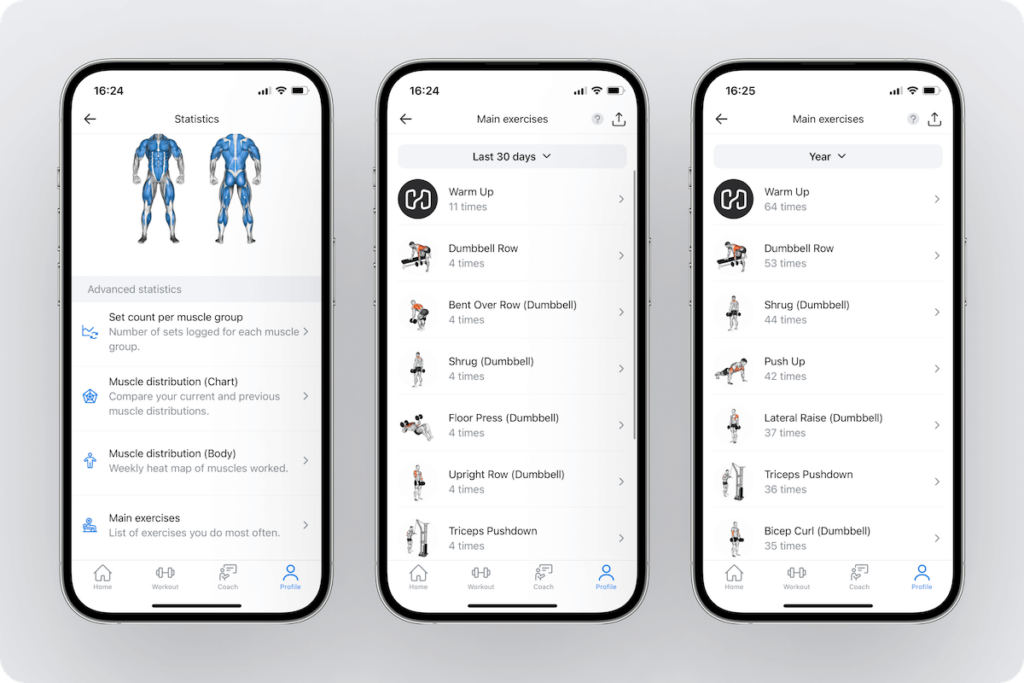
Key Highlights:
- Manual workout tracking with custom routines
- Progress charts and history logs
- Supports supersets and custom exercises
- Clean, minimal interface
- Cross-device syncing and data export
Who it’s best for:
- People who plan their own strength training
- Users wanting a no-frills logging tool
- Lifters who prioritize control over data and routine creation
Contact Information:
- App store: apps.apple.com/us/app/hevy-workout-tracker-gym-log
- Google Play: play.google.com/store/apps
- Website: www.hevyapp.com
- Twitter: x.com/hevyapp
- Facebook: www.facebook.com/hevyapp
- Instagram: www.instagram.com/hevyapp

8. Future
Future connects users with personal fitness coaches who provide one-on-one guidance through messaging and video check-ins. Each coach designs training programs tailored to the user’s goals, schedule, and feedback. Communication happens regularly, and coaches adjust workouts weekly based on how the user responds. While the app offers flexibility in where and how users train, it emphasizes consistency and coach-driven accountability over automated features.
The platform focuses heavily on maintaining user engagement through human interaction rather than AI-generated programming. All training is personalized, and workouts are delivered through the app with built-in tracking features. Users can interact with coaches for encouragement or to modify training plans as needed. There is no community or content-based motivation — the emphasis is on direct communication between user and coach.
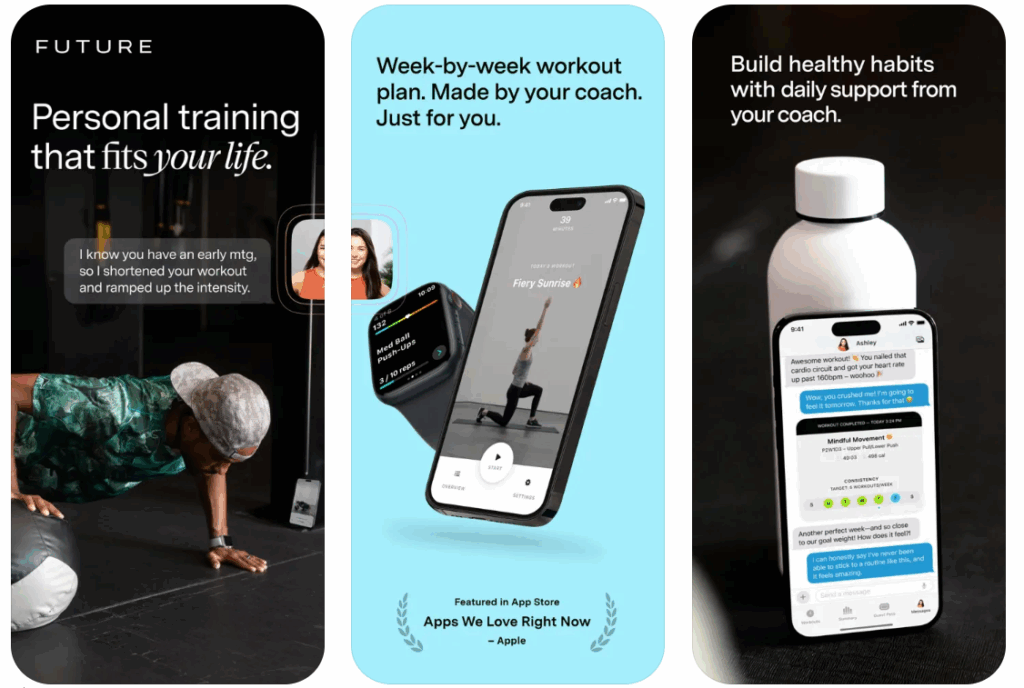
Key Highlights:
- Weekly personalized programs from a real coach
- Video and text check-ins for accountability
- Flexible training plans based on user schedule and feedback
- Ongoing program adjustments
- No AI-generated routines
Who it’s best for:
- People who want personal coaching without gym visits
- Users who benefit from consistent check-ins and guidance
- Individuals looking for high accountability in training
Contact Information:
- Google Play: play.google.com/store/apps/details
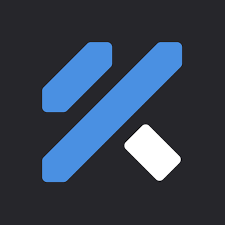
9. FitnessAI
FitnessAI generates workout plans using an algorithm that adjusts weight, reps, and sets based on user performance. The system is built on millions of past workouts and follows principles like progressive overload. Each session is optimized by the app without user input, allowing the algorithm to handle all adjustments automatically. The focus is on strength training and lifting routines, without variety in workout styles or cardio options.
The app offers features like rest time guidance, progress tracking, and automated difficulty scaling. Users can also message support for advice, but there is no assigned coach. It is meant for those who want a data-driven program with minimal interaction or setup. The interface is simple, making it accessible for people who want to train without overthinking their routine.

Key Highlights:
- AI-driven adjustment of weight, reps, and sets
- Based on a large dataset of logged workouts
- Simple logging interface with minimal input
- Progress tracking and training visualization
- Optional messaging support
Who it’s best for:
- Lifters who want automated, adaptive programming
- Users who don’t need personal coaching or planning
- People interested in consistent strength progression
Contact Information:
- App store: apps.apple.com/us/app/fitness-ai-gym-workout-planner
- Google Play: play.google.com/store/apps

10. Bodylura
Bodylura offers structured workout programs combined with meal tracking and macro calculation tools. It’s designed for women and features various training options for different fitness goals and life stages. Users can choose programs for home or gym, with content ranging from beginner routines to advanced plans. It includes support for recovery sessions and guided tutorials.
In addition to workouts, the app provides nutrition tools like a meal tracker and recipe suggestions. Community support is present through group interaction and access to personal trainers and dietitians. The app emphasizes a comprehensive approach to training, with progress tracking, journaling, and calendar tools to maintain consistency.
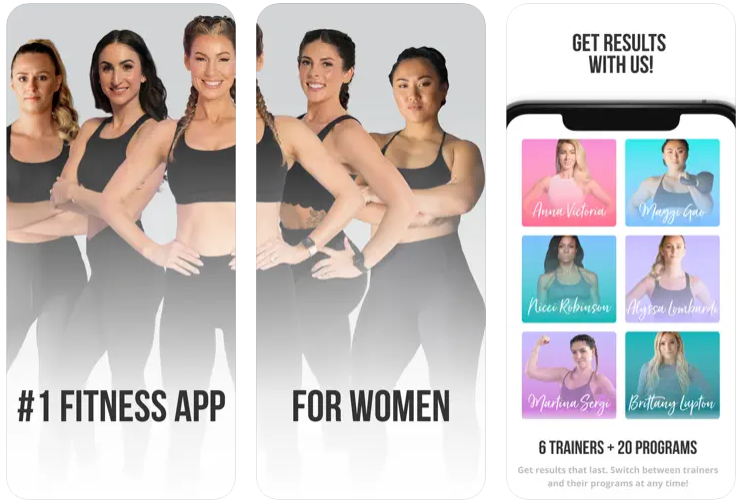
Key Highlights:
- Workout programs for all levels and life stages
- Macro calculator and meal tracking features
- Recovery and form tutorials
- Calendar-based progress tracking
- Community and coaching access
Who it’s best for:
- Women looking for structured programs and nutrition tools
- Users who want both fitness and dietary tracking
- People who prefer guided but flexible routines
Contact Information:
- App store: apps.apple.com/us/app/bodylura-fitness-nutrition
- Google Play: play.google.com/store/apps
- Website: bodylura.com
- Facebook: www.facebook.com/fitbodyapp
- Instagram: www.instagram.com/fitbodyapp

11. Sworkit
Sworkit offers a broad range of fitness programs, including strength, flexibility, cardio, and recovery. Users can create custom workouts or follow predefined ones based on their goals. It caters to a wide audience with content suitable for all fitness levels and provides options for individual users, employers, and health organizations. Programs can be adjusted by time, type, or fitness outcome.
The app includes mindfulness and nutrition content alongside exercise routines. Trainers are available to answer fitness and nutrition questions, but there is no ongoing coaching or accountability system. The design is focused on accessibility, offering flexible workouts for people training at home or on the go.
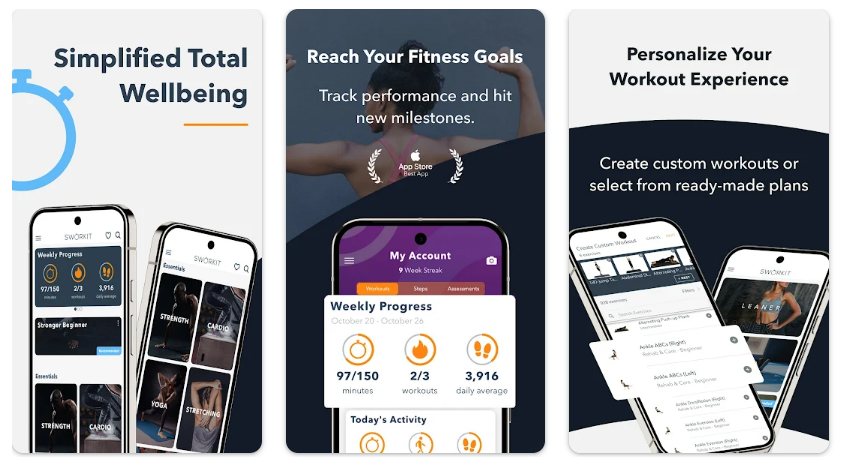
Key Highlights:
- Custom and guided workout programs
- Content for strength, cardio, flexibility, and more
- Mindfulness and nutrition integration
- Adjustable by time and goal
- Trainer support for questions
Who it’s best for:
- Users looking for variety in workout types
- People who want quick, flexible workouts
- Individuals without need for detailed programming
Contact Information:
- App store: apps.apple.com/us/app/sworkit-fitness-workout-app
- Google Play: play.google.com/store/apps
- Website: sworkit.com
- Twitter: x.com/sworkit
- Facebook: www.facebook.com/sworkit
- Instagram: www.instagram.com/sworkit
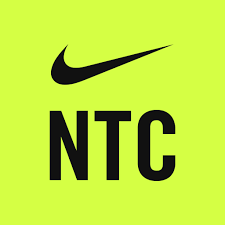
12. Nike Training Club
Nike Training Club provides a wide variety of workouts across training styles including strength, yoga, and mobility. It delivers structured programs as well as single-session workouts that can be filtered by duration, intensity, and equipment. The app includes guidance on recovery, mindset, and nutrition, forming a holistic approach to training.
Users can follow curated workout series or jump into one-off sessions depending on their schedule. The app is free and offers support from Nike trainers through video content and written tips. There are no coaching or communication features, and tracking is limited to workout completion rather than detailed metrics.

Key Highlights:
- Strength, yoga, and mobility workouts
- Free content with structured programs
- Recovery and wellness guidance included
- Video-led sessions with Nike trainers
- No tracking or personal coaching
Who it’s best for:
- People who want free, video-based workouts
- Users looking for variety and lifestyle-focused fitness
- Those who prefer self-guided training without data tracking
Contact Information:
- App store: apps.apple.com/us/app/nike-training-club-wellness
- Google Play: play.google.com/store/apps
- Website: www.nike.com
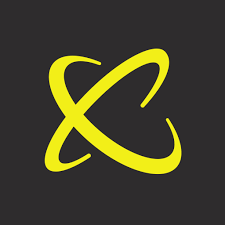
13. Centr
Centr offers a wide range of strength-focused and general fitness programs that can be done at home, in the gym, or on the go. The app combines self-guided workouts, fully coached sessions, and audio-based training to match different user preferences. Each program is built around the user’s experience level and personal goals, with guidance on reps, weights, and intensity. Centr also integrates wellness content, such as mindfulness and recovery sessions, into its training library.
Programs on the platform range from beginner-level bodyweight training to advanced weightlifting routines. Users can select specific goals like muscle building, fat loss, or performance improvement. In addition to the training plans, Centr includes recipe suggestions and structured meal plans. While there’s no one-on-one coaching, the app provides curated guidance from a team of fitness professionals and nutrition experts.
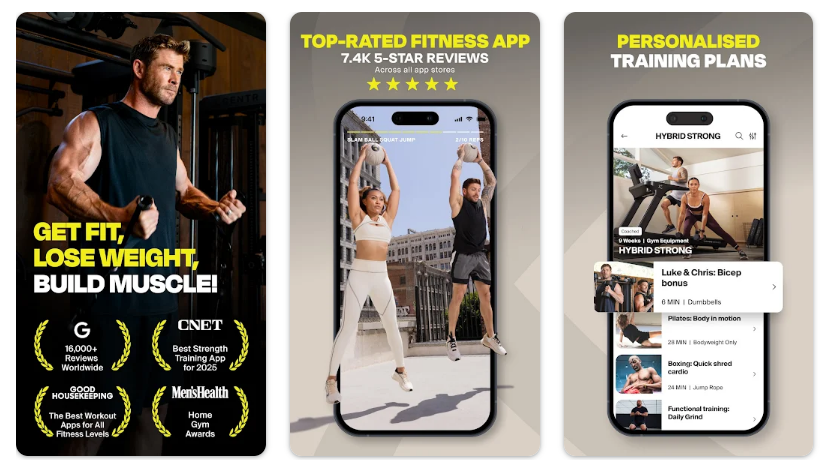
Key Highlights:
- Self-guided, audio, and coached workouts
- Structured programs for different goals and fitness levels
- Includes wellness, mobility, and nutrition content
- Compatible with gym or home workouts
- Expert-led sessions without personal coaching
Who it’s best for:
- Users who want variety in training formats
- People looking to combine strength, cardio, and recovery
- Individuals comfortable training without live coaching
Contact Information:
- App store: apps.apple.com/us/app/centr-personal-fitness-app
- Google Play: play.google.com/store/apps
- Website: centr.com
- Facebook: www.facebook.com/CentrFit
- Instagram: www.instagram.com/centrfit
- LinkedIn: www.linkedin.com/company/centrapp
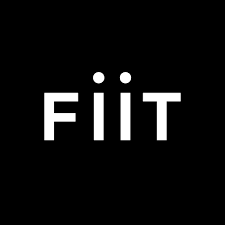
14. Fiit
Fiit delivers structured workout classes across strength, cardio, yoga, and mobility. The app is designed for users who prefer class-style sessions led by instructors, either live or on-demand. Workouts vary in intensity and can be filtered by time, goal, or category. The app supports both home and gym use and integrates fitness tracking with compatible devices.
Fiit also provides access to leaderboards, performance tracking, and hybrid training programs like those tailored for HYROX events. While there is no personalized coaching, the app focuses on instructor-led content that encourages progression through clear programming. It also includes community engagement and performance feedback tools.
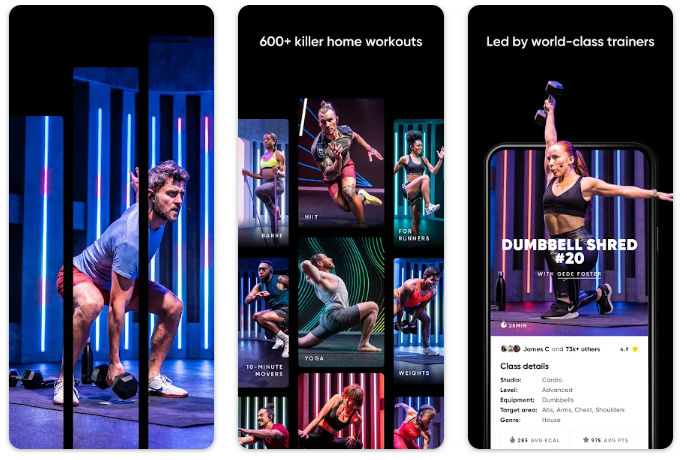
Key Highlights:
- On-demand and live classes for strength, cardio, and flexibility
- Progress tracking and leaderboard features
- HYROX-focused programs available
- Options for home and gym workouts
- No individual coaching or adaptive AI
Who it’s best for:
- People who enjoy group class-style training
- Users looking for variety and instructor-led sessions
- Those training for hybrid competitions like HYROX
Contact Information:
- App store: apps.apple.com/us/app/fiit-workouts-fitness-plans
- Google Play: play.google.com/store/apps
- Website: fiit.tv
- Facebook: www.facebook.com/Fiit.tv
- Instagram: www.instagram.com/FIIT
- LinkedIn: www.linkedin.com/company/fiit.tv

15. Apple Fitness+
Apple Fitness+ offers a wide library of video workouts across different categories, including HIIT, strength, yoga, core, dance, and more. Workouts range from 5 to 45 minutes and are guided by certified trainers. The app integrates with Apple devices, using the Apple Watch for real-time workout metrics and personalized recommendations.
Programs are available for beginners through advanced users and include guided meditation and cooldowns. There is no individualized coaching or feedback, but users can follow curated plans or create their own routines using the app’s filtering tools. Apple Fitness+ focuses on simplicity, broad accessibility, and integration with other Apple services.
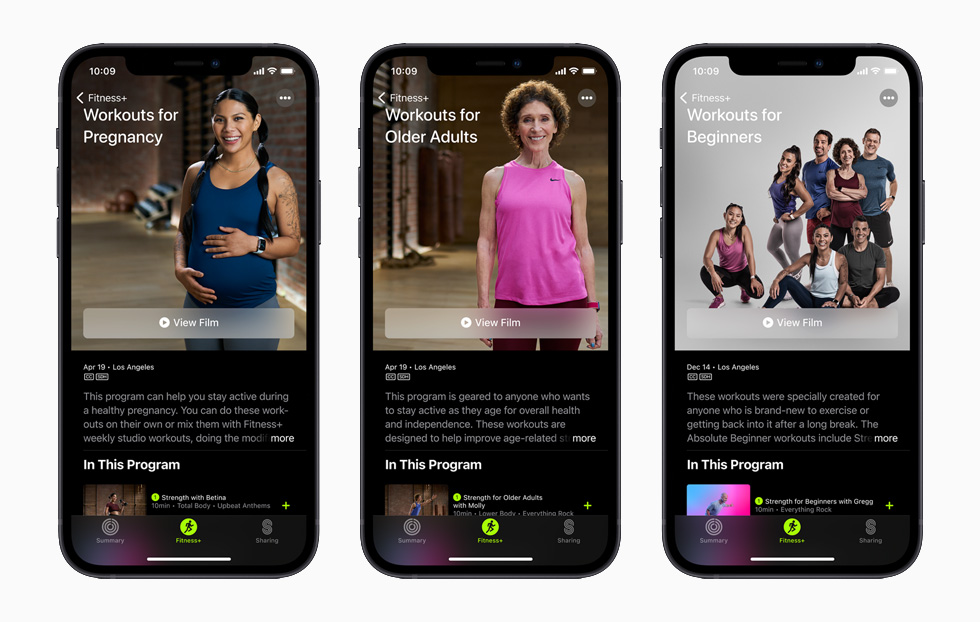
Key Highlights:
- Large library of video workouts across 12+ categories
- Real-time tracking with Apple Watch integration
- New content added regularly
- Meditation and recovery included
- No personalized feedback or coaching
Who it’s best for:
- Apple users wanting device-integrated workouts
- People looking for variety in workout types and durations
- Users interested in fitness, recovery, and mindfulness
Contact Information:
- Website: www.apple.com
- Phone: 1-800-692-7753
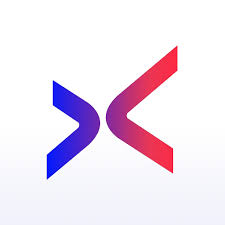
16. Aaptiv
Aaptiv combines AI-generated workout plans with on-demand audio and video sessions. It caters to individuals and organizations by offering training programs, wellness content, and access to a gym network. Workouts include strength, cardio, and flexibility-focused routines, as well as guided meditations and mindfulness exercises.
The app generates training suggestions based on personal goals and uses audio coaching for most sessions. It doesn’t provide individual coaching but gives structured support through its library of over 10,000 sessions. Aaptiv is designed for those who want guidance without live interaction, offering a mix of automated planning and instructor-led classes.
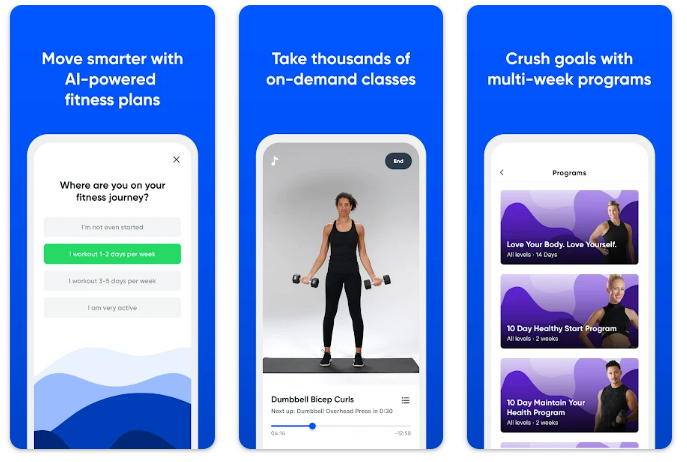
Key Highlights:
- Audio-based coaching for training and wellness
- Large on-demand library of workouts
- AI-generated workout plans
- Mindfulness and meditation content included
- Available to individuals and employers
Who it’s best for:
- Users who prefer audio coaching and guided workouts
- People looking for a mix of fitness and wellness tools
- Employers or organizations offering fitness access to teams
Contact Information:
- App store: apps.apple.com/us/app/aaptiv-1-audio-fitness-app
- Google Play: play.google.com/store/apps
- Website: aaptiv.com
- Facebook: www.facebook.com/Aaptiv
- Instagram: www.instagram.com/aaptiv
- LinkedIn: www.linkedin.com/company/aaptiv
Conclusion
Weightlifting apps vary widely in their features, design, and level of guidance. Some focus on automation and data-driven programming, while others prioritize one-on-one coaching or class-style training. Whether someone needs a basic workout logger, personalized strength program, or a full-featured app with nutrition and recovery tools, there are options suited to different goals and preferences.
Choosing the right app depends on how much structure, personalization, and support the user wants. From manual tracking tools to AI-generated plans and coach-led programs, each platform offers its own way to support progress in the gym or at home. Evaluating these options based on training style, equipment, and level of experience can help users find the tool that fits their needs best.
